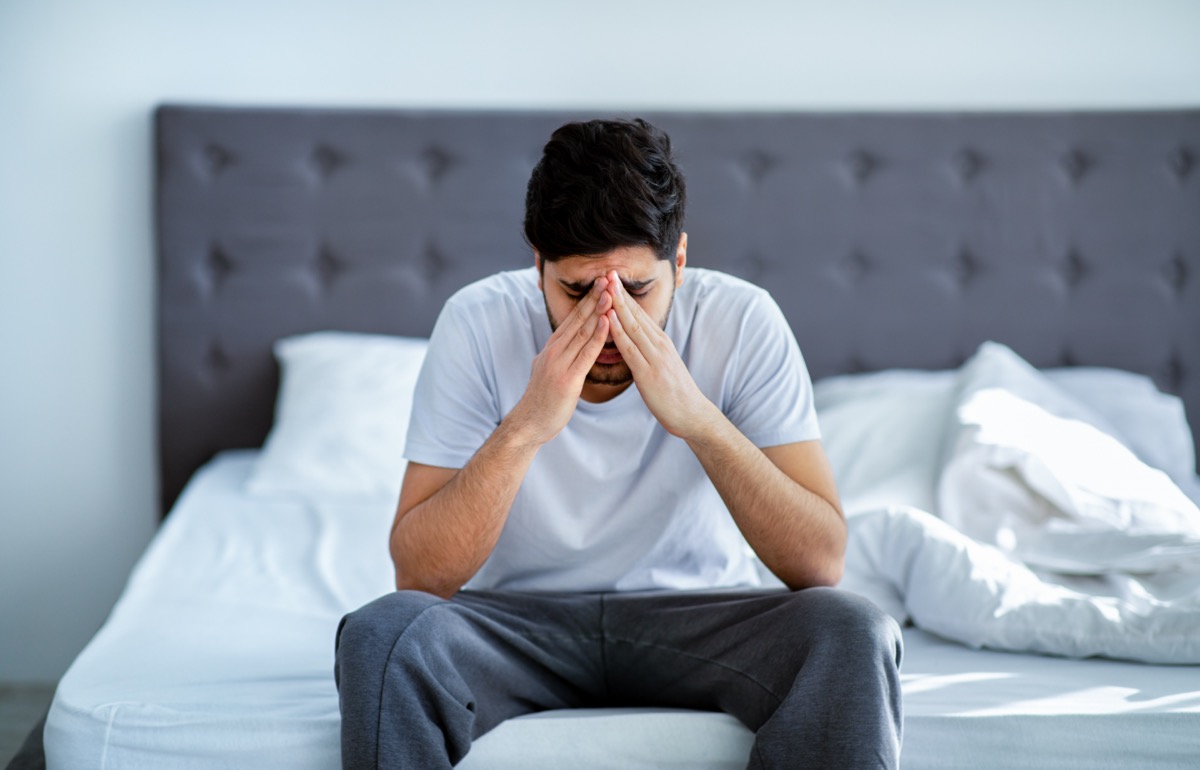If you've had COVID before, that doesn't mean you're automatically immune to it. But it could mean you get symptoms that last longer than a year, maybe a lifetime. This issue—called "Long COVID" or PASC (post-acute sequelae SARS-CoV-2 infection)—was the focus of a big new study published yesterday in The Lancet. It's a problem that can happen to anyone—young or old. "The need to understand and respond to long COVID is increasingly pressing," said a The Lancet editorial about the study. "Symptoms such as," those found in the study, "could debilitate many millions of people globally." Read on for 9 of the symptoms mentioned in the study—and to ensure your health and the health of others, don't miss these Sure Signs You Have "Long" COVID and May Not Even Know It.

Long COVID sufferers sometimes find "fatigue" too quant a word to describe what they are feeling; it's not like you're tired after a tough day at the office. No, instead it can feel like "your mind and body can no longer function," in the words of one patient, "and they are shutting down, as if you were unplugged. But you're awake while it's happening." As with Chronic Fatigue Syndrome, many "long haulers" can feel a crushing fatigue after physical exertion—not running a marathon (which they can't run at all) but after menial tasks (like doing the dishes or breaking down recycling boxes). "Fatigue was the most commonly reported symptom of patients with SARS, which could last as long as 4 years," say the study's authors.

"What would you do if you could not fall asleep for weeks on end? What if your insomnia and sleep problems stem from an illness you contracted months ago and your lingering symptoms puzzled medical professionals? This is the difficult reality for Long COVID patients, who suffer side effects long after tests determine that the virus has left their body," reports Sleep Cycle. "The coronavirus can have a long-term neurological effect on its survivors, sometimes manifesting as insomnia. Five percent of COVID-19 patients in a recent study experienced insomnia. For those admitted to the Intensive Therapy Units, this leaps to 7.5 percent; for encephalopathy patients, this jumps to 10 percent. Research specific to this insomnia is still underway."

Actress Alyssa Milano is just one notable long hauler who has lost some hair as the result of a COVID infection. "I just wanted to show you the amount of hair that's coming out of my head as a result of COVID," the actress and activist said, on Instagram, begging her followers to "please take this seriously" and "wear a…mask."

Smell disorders—like anosmia, where you lose your sense of smell entirely—are a hallmark symptom of a COVID infection. What you may not know is that they can last for more than a year. "Parosmia or distortion of smell is currently regarded as one of the long COVID-19 syndrome or chronic COVID-19 syndrome. Carfi et al found that 87.4% of patients in their study who recovered from COVID-19 had at least one persistent symptom with loss of smell among them. However, recent reports have discovered that a number of patients with loss of smell or anosmia regained their smell, yet surprisingly this time, the smell was distorted. The magical aroma of coffee had turned into a nightmare as coffee began to smell pungent like gasoline and favourite dishes were turning to smell more like rotten food or garbage, which inadvertently affects taste as food becomes almost unpalatable," says a study in BMJ Journal.

"For people who have had COVID-19, lingering COVID-19 heart problems can complicate their recovery. Some of the symptoms common in coronavirus "long-haulers," such as palpitations, dizziness, chest pain and shortness of breath, may be due to heart problems — or, just from having been ill with COVID-19," reports Johns Hopkins.
RELATED: I'm a Doctor and Here's How to Not Catch Delta

Pain—in your joints, head, neck, chest, anywhere—can haunt you for ages after a COVID infection. "Some people are experiencing a range of new or ongoing symptoms that can last weeks or months after first being infected with the virus that causes COVID-19," reports the CDC. "Unlike some of the other types of post-COVID conditions that only tend to occur in people who have had severe illness, these symptoms can happen to anyone who has had COVID-19, even if the illness was mild, or if they had no initial symptoms."
RELATED: Dr. Fauci Just Said When We'd Be Back to "Normal"

"A loss of appetite alongside fever tends to be a sign of a mild case of COVID-19. Whereas, people with more severe cases will have a loss of appetite alongside confusion, or clustered with shortness of breath, diarrhoea and abdominal pain," reports the ZOE Symptom Study. This loss can continue with Long COVID. "Covid-19 affects all organs of the body through the primary respiratory system. Gastrointestinal symptoms are present in almost 60% of the patients. In the second wave, we observed that most of Covid patients had symptoms of stomach flu-like nausea, vomiting, abdominal pain, and diarrhea," Dr Kunal Das, HOD and consultant – gastroenterology, HCMCT in Manipal, told News 18.

Given everything you've just read, it's no surprise long haulers have mobility problems. They are in pain. They are fatigued. Exertion can bring on crushing migraines. So even the act of a simple walk can present problems and setbacks. "I can see the world just fine," says one long hauler. "But I cannot move around in it. I'm in a virtual prison."
RELATED: You're Now Mandated to Wear a Face Mask in These 8 States

Worry over new and scary symptoms is understandable. So is depression over missing your "previous life"—especially as America pushes "back to normal." There could also be a neurological reason for such feelings. "The concept of so-called long COVID has gained prominence in recent months, with some patients reporting persistent neurological manifestations, from milder symptoms such as headaches, hyposmia, hypogeusia, and fatigue to more severe conditions including sleep disorders, pain, cognitive impairment, and (in very rare cases) Guillain-Barré syndrome," says a report in The Lancet.
RELATED: These States Are Seeing a Huge Rise in Delta Hospitalizations

If you notice any strange symptoms that may be COVID, contact a medical professional and get a COVID test; if you have symptoms like the ones you've just read, or symptoms you never had before that just aren't going away, discuss your case with a medical professional. Although there is no cure for Long COVID, doctors are getting more used to trying to treat the symptoms, with varying degrees of success. (No silver bullets yet.) And to protect your life and the lives of others, don't visit any of these 35 Places You're Most Likely to Catch COVID.
Article From & Read More ( Sure Signs You May Have Already Had COVID, Says New Study | Eat This Not That - Eat This, Not That )https://ift.tt/3Dq90GI
Health
Bagikan Berita Ini














0 Response to "Sure Signs You May Have Already Had COVID, Says New Study | Eat This Not That - Eat This, Not That"
Post a Comment